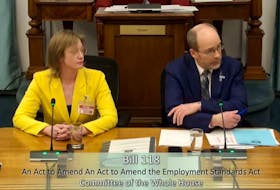While the province has taken some steps to improve its record since 2013 on migrant workers’ rights, there are still certain areas where improvements in the protection and status of migrant workers in this province are needed, says the Copper Institute.
Paola Soto, migrant worker outreach co-ordinator with the Cooper Institute, notes hundreds of workers come to P.E.I. from different countries each year.
“They contribute to our economy and to our communities and yet they don't have the same rights as the rest of the workers,’’ he says.
“Migrant workers are vulnerable to abuse and exploitation due to factors such as language barriers, isolation, lack of access to assistance and information about their rights and employer-specific work permits. Our government can reduce these gaps by enhancing services and through the application of specific labour laws to offer equal conditions for all workers in our province.”
"Migrant workers are vulnerable to abuse and exploitation due to factors such as language barriers, isolation, lack of access to assistance and information about their rights and employer-specific work permits.”
-Paola Soto
Although P.E.I.’s Provincial Nominee Program and the Atlantic Immigration Pilot Program in the Maritime provinces have opened important pathways to permanent residency, a significant proportion of migrant workers, including seasonal agricultural workers, have no access to these programs and thus are denied the possibility of permanent immigration, adds Soto.
He says there is still a lot to do to protect workers from recruitment agencies with abusive practices.
For example, he notes, some agencies have the power to decide which contracts will be renewed, putting workers in a situation of submission because they fear retaliation from the agency. Other issues include lack of inclusion of agricultural workers in the Employment Standards Act and access to public health coverage, increasing their vulnerability and marginalization, adds Soto.
The Canadian Council for Refugees has published a series of report cards assessing the records of federal and provincial governments on the protection of the rights of migrant workers coming to Canada through the Temporary Foreign Workers Program (ccrweb.ca/en/migrant-workers/report-cards).
The document is an update of the original report cards published in May 2013.
Soto says the reports provide a glimpse into the reality of migrant workers in P.E.I. and the country, highlighting the gaps and challenges that need to be addressed “to build a more equitable and fair society’’.









